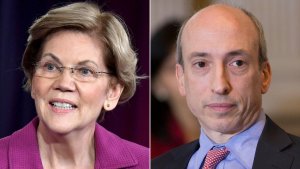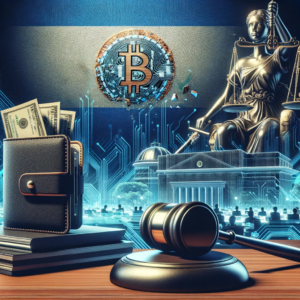XRP community shocked at Senator Warren and SEC Chair “orchestrated powerplay” to outflank CFTC
“Senator Warren gave Gensler every opportunity to say the SEC must control things. The only thing she didn’t ask him is if he wanted a puppy.”

Senator Elizabeth Warren has sent a letter to SEC Chair Gary Gensler to request information about the regulator’s “authority to properly regulate cryptocurrency exchanges and to determine if Congress needs to act to ensure that the SEC has the proper authority to close existing gaps in regulation”.
Asking for a response by July 28, Senator Warren mentions the dangers to investors and consumers “in this highly opaque and volatile market” especially now that trading volumes have skyrocketed: Coinbase (the largest exchange in the US) saw volumes exploding from $30 billion in Q1 2020 to more than 10-fold in Q1 2021, even before going public.
Now that Coinbase trades on the Nasdaq, it gives mainstream investors who may be wary of directly buying risky digital securities the ability to own stock in a Securities and Exchange Commission-approved business that facilitates the transactions.
The Senator then pointed out the regulatory gaps that allow for trading volume manipulation – 95% of the volume of trading of Bitcoin listed on CoinMarketCap “is fake and/or non-economic in nature”, according to a study – and issues with custody of assets.
Cryptocurrency traded on exchanges is “deposited and probably co-mingled with the deposits of others. It is not recorded on the blockchain; it is represented by an entry in an electronic, centralized ledger. It is uninsured and there is no guarantee [the trader] will get it. [Traders] must rely on—trust—the intermediary.”
“Additionally, because cryptocurrency exchanges lack the same type of regulation as traditional securities exchanges, they can also engage in practices like proprietary trading and wash trading to take advantage of their customers without sufficient disclosures”, the US Senator continued, pointing to a 2018 report that found nearly 20% of the executed volume on Coinbase was proprietary.
The questions Senator Warren sent to the SEC Chair, to be answered by July 28, 2021, are the following:
1. Do you believe that cryptocurrency exchanges are currently operating in a “fair, orderly, and efficient” manner? If not, what problems has the SEC identified that are associated with the use of these exchanges?
2. How do the characteristics of assets traded on cryptocurrency exchanges differ from those of assets traded on traditional securities exchanges? Do these characteristics warrant additional investor and consumer protections for cryptocurrency exchanges relative to those provided for traditional exchanges?
3. Describe the extent of the SEC’s existing authority to regulate existing cryptocurrency exchanges. To what extent does that authority differ from the agency’s authority over traditional securities exchanges?
4. Foreign regulators have moved to restrict cryptocurrency exchanges in their jurisdictions in recent years while calling for international coordination to address regulatory gaps. One specific regulatory challenge may arise from the unique organizational structure of some global exchanges. For example, Binance, one of the largest cryptocurrency exchanges in the world by trading volume, “is everywhere and yet based nowhere. The cryptocurrency exchange has processed trillions of dollars in trades this year as it transfers digital and conventional money around the world through a constellation of affiliates. And yet it has no headquarters.”
In your view, to what extent is international coordination needed to address gaps in the regulation of cryptocurrency exchanges and ensure the protection of investors and consumers in the United States?
5. In a recent address, Commodity Futures Trading Commission (CFTC) Commissioner Dan M. Berkovitz stated: “In a pure ‘peer-to-peer’ DeFi system… [t]here is no intermediary to monitor markets for fraud and manipulation, prevent money laundering, safeguard deposited funds, ensure counterparty performance, or make customers whole when processes fail. A system without intermediaries is a Hobbesian marketplace with each person looking out for themselves. Caveat emptor—‘let the buyer beware.’” Berkovitz further argues that DeFi derivative instruments are likely illegal under the Commodity Exchange Act.
a. Do you agree with Commissioner Berkovitz’s assessment of DeFi platforms?
b. Do decentralized platforms raise similar investor and consumer protection concerns within the SEC’s jurisdiction? If so, what challenges does the SEC face in addressing these concerns?
c. Do the characteristics of decentralized cryptocurrency exchanges warrant additional investor and consumer protections relative to those needed for centralized cryptocurrency exchanges?
An orchestrated powerplay by Gensler, Senator Warren, and the SEC to outflank the CFTC?
The Twittersphere is raising the alarm, calling this letter a chess move that aims to definitively offer the Securities and Exchange Commission authority over digital assets and its ecosystem.
“Gensler and Warren are uniquely close and it is likely the SEC saw this letter before it was publicly sent (common practice among staffers)”, said Ron Hammond, Director of Government Relations at the Blockchain Association.
James K. Filan, an influential attorney close to the XRP community, went for the jugular: “This is an orchestrated powerplay by Gensler, @SenWarren and the @SEC_News to outflank the @CFTC for control of the crypto space. @SenWarren gave Gensler every opportunity to say the SEC MUST control things. The only thing she didn’t ask him is if he wanted a puppy.”
“Here’s the SEC’s hook: “And even though they share many features of traditional securities exchanges, such as “bring[ing] together buyers and sellers, execut[ing] trades, and display[ing] prices, cryptocurrency exchanges may be able to escape federal regulation if the digital asset being traded does not qualify as a security under federal law.”
“I’m thinking the answers we’ll see to @SenWarren’s questions were drafted before the actual questions”, Mr. Filan tweeted.
Lack of clarity in the United States fuels dispute between the SEC and CFTC
The lack of regulatory clarity in the emerging digital asset class in the United States has fueled many controversies throughout the years, with the latest being the SEC v. Ripple lawsuit.
There is still no clear understanding of what makes a cryptocurrency a security or not, and whether it should be regulated under the authority of the CFTC or the SEC.
The Ripple lawsuit has been widely considered as an opportunity to finally make all questions go away. CFTC Commissioner Dawn D. Stump has publicly stated that the regulator is closely watching the outcome of the SEC v. Ripple. “The question of whether XRP is a security will be crucial.”
Still, a digital asset doesn’t have to be a security in order to the SEC press charges against a blockchain company, according to “crypto mom” Commissioner Hester Peirce.
As the SEC is getting closer to outflank the CFTC, the top cryptocurrencies by market cap – which tend to get more scrutiny from regulators – were analyzed by attorney Jeremy Hogan for their “danger rating” of being sued by the SEC.
You might also want to read:
Will the Ripple lawsuit turn against Ethereum with the SEC revisiting its status?
SEC v. Ripple: Why is the lawsuit taking so long?
SEC finds Ripple’s argument “ironic” in bid to avoid controversial deposition









